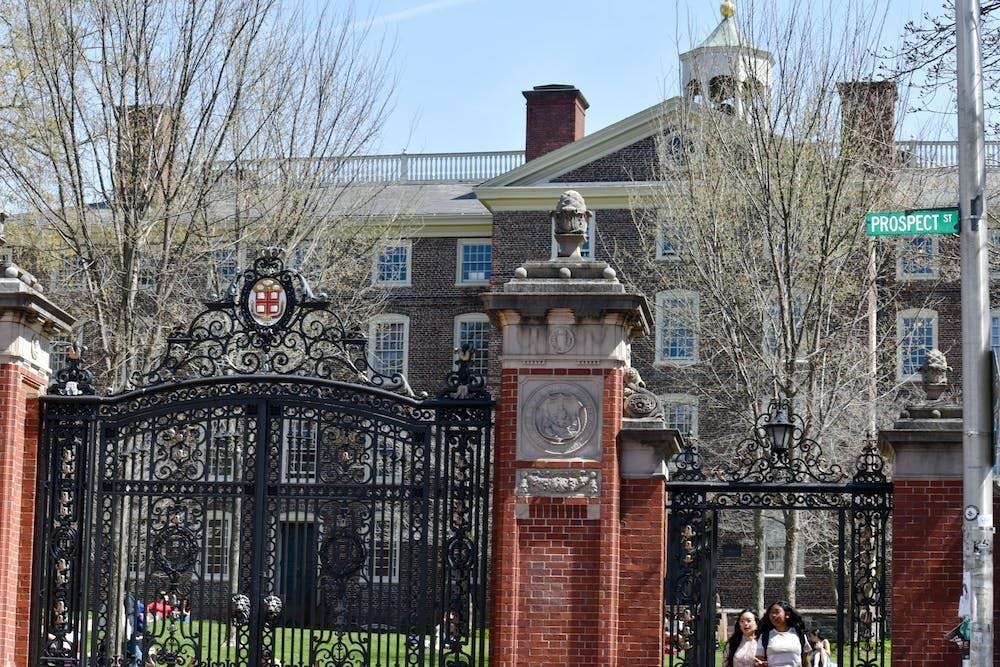On Friday afternoon, 898 of 6,244 early decision applicants joined the Brown University undergraduate community through the early decision admission process, Associate Provost for Enrollment and Dean of Admission Logan Powell told The Herald. This year’s early decision admitted cohort is the largest in the University’s history.
With an acceptance rate of 14.4%, this early decision cycle was the second-most selective in Brown’s history. Applicants to the class of 2028 are among the country’s first to be considered under a new application review process developed after the Supreme Court struck down affirmative action policies in June.
There were 64 applicants accepted through the QuestBridge program for low-income and first-generation students, compared to 62 applicants last year.
Twenty-two students — 3% of those who applied — gained admission to the Program in Liberal Medical Education, the University’s combined undergraduate and medical school program. A similar share of PLME applicants were admitted in last year’s early decision process.
The University received its second-largest early applicant pool in history this year. Last year’s early decision cycle still holds records for the most applicants and lowest acceptance rate in the University’s history.
Powell characterized the incoming class as “remarkably strong,” adding that the Office of Undergraduate Admission is “deeply honored that so many incredible students indicated Brown as their top choice college.”
Of the 6,244 prospective Brunonians, 67.6% were denied admission and 16.8% were deferred for consideration with the incoming regular decision applicant pool. This continues a pattern of decreasing deferral rates in the past few years: 30% for the class of 2025, 25% for the class of 2026 and 19% for the class of 2027.
An additional 58 applications were incomplete, meaning that they did not submit all required application materials to make an admission decision at the time, Powell said.
Of the admitted students, 53.3% attended public schools, 35.4% attended private schools and 11.2% attended parochial schools. These figures are in keeping with last year’s numbers.
Female students made up 52% of the incoming class, with male students filling in the other 48%. In recent years, women have accounted for nearly twice as many applications as men, despite being admitted at a similar rate. The University’s gender disparity in acceptance rates is the largest among the Ivy League.
The class of 2028 sets a new record for first-generation students, with 19% being the first in their family to attend college. In recent years, this figure ranged from 15% to 17%.
The share of students applying for financial aid is similar to past years, Powell said, adding that exact statistics could not be provided due to the delayed release of the Free Application for Federal Student Aid as the Department of Education updates the form.
Brown students who applied through the early decision process are less likely to receive financial aid compared to those who applied through regular decision, The Herald previously reported. They are also more likely to have legacy status, attend private high schools and come from families that have attended higher education.
Admitted domestic students hail from 45 states, as well as the District of Columbia and Puerto Rico. The University admitted students from 51 countries, with the most popular international home countries being Canada, China, the United Kingdom, India, South Korea, Peru and Singapore.
According to the Supreme Court’s June ruling on affirmative action, admission offices nationwide can no longer consider applicants’ race except with regard to how race “affected his or her life.” A number of community members condemned the decision and raised concerns over a potential drop in racial diversity on college campuses.
Following the ruling, Brown’s admission officers received training on how to review applications in adherence to the SCOTUS decision through workshops hosted by the Office of the General Counsel, according to the University’s website.
The University has made several changes to its admission and recruitment policies since June, including updating its supplemental application essay prompts to include a question that asks students to reflect on “where they came from.” The University also pledged to invest in targeted application recruitment.
“Our four new short answer essay questions allowed us to gain even greater insights into the interests, experiences and aspirations of these prospective students,” Powell wrote.
In relation to recruitment efforts, Powell highlighted partnerships with community based organizations and Providence Public Schools.
As the University reconsiders its admissions policies, the class of 2028 may be the last to be admitted under early decision.
In September, President Christina Paxson P’19 P’MD’20 convened an ad hoc committee to reconsider, among other policies, the University’s use of an early decision application round. The committee has been actively meeting and plans to release its recommendations before the start of the spring 2024 semester.
“It was abundantly clear that this cohort of applicants, like others that came before them, is concerned about the many challenges we are facing in the world and committed to solving complex problems,” Powell said in an email to The Herald.
In past years, approximately 50% of incoming classes were enrolled through the early decision admissions process. The Office of Undergraduate Admission will begin reviewing regular decision applications as their Jan. 3 deadline approaches.

Owen Dahlkamp was the managing editor of newsroom on The Herald's 135th Editorial Board, overseeing the paper's news operations. Hailing from San Diego, CA, he is concentrating in Political Science and Cognitive Neuroscience with an interest in data analytics. In his free time, you can find him making spreadsheets at Coffee Exchange.





